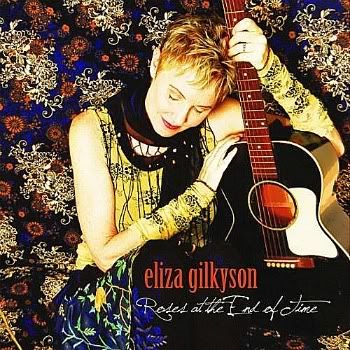
[purchase]
I saw Eliza Gilkyson perform at the Falcon Ridge Folk Festival last year. I remember that it was hot, and their were lots of people around. I don’t remember the songs she performed. But the next time I see her, it will be different. Roses at the End of Time is the first Gilkyson album I have ever heard, and I will not forget these songs. They are marvels of subtlety, and fine examples of the art of songwriting. It’s just that Gilkyson’s art is intimate, and a festival is probably not the best place to hear it for the first time.
On Roses, Gilkyson plays acoustic guitar most of the time, and she when switches to electric on some tunes, she does so for the difference in tone, but stays with the same technique. Most songs have a second guitar, either electric or acoustic, a bass, likewise either stand up or electric, and all but two songs have some kind of drums or percussion. No one steps out to take a solo, and neither are these songs driven by hooks. Instead, the band creates a set of textures that are completely in synch with the intent of each song. So Slouching Towards Bethlehem has a sort of gut bucket gospel feel, sort of like a Tom Waits song with the rough edges smoothed out some. Death in Arkansas sounds like an old time bluegrass song that is in danger of succumbing to modernity, which perfectly suits its subject matter. Belle of the Ball has an appropriately haunted sound. In short, the band here shows an astonishing tonal range, and Gilkyson shows a great gift for creating diverse musical settings that perfectly suit her songs. On top of all this is Gilkyson’s voice. As the album begins, it would be easy to Gilkyson a limited singer. She sings in a slightly scratchy alto, and she does not appear to have a wide range in terms of notes. But the more I listened, the more I came to marvel at her tonal and emotional range. She doesn’t raise her voice much, but she uses subtle shadings to put over a wide range of material. Blue Moon Night conveys a sense of wonder, 2153 is gently mocking, and Belle of the Ball and Vayan al Norte tug at the heartstrings in different, but equally powerful ways. Elsewhere, she conveys love, longing, and road weariness with equal eloquence.
Of course, the writing has something to do with it too. Vayan al Norte is an amazing piece of songwriting. Gilkyson presents Mexican immigrants in the United States. She begins the song in English, but Spanish words begin to slip in, and then take over completely. Thanks to a full English translation on Gilkyson’s website, I can tell you what’s going on here. The narrator of the song starts out emotionally in the US, but slowly their consciousness returns to Mexico, and what they had to leave behind to come here. The music also shifts subtlety to become more Mexican sounding. It’s a brilliant device. Once I Had a Home starts out sounding like it is about someone who became homeless when their house was foreclosed, but later it sounds more like it is about Native Americans who were forced from their lands and onto the reservations. The song ends up making a powerful connection between the two without explicitly stating either one. Other songs are more direct. Blue Moon Night captures a fleeting moment in time. The song has great beauty, but also a wonderful wistful quality. And Slouching Towards Bethlehem rides a great groove to spell out some of the evils of the world. It manages the trick of having a gospel fervency without sounding preachy in the least.
Blue Moon Night was great way to open this album. Its momentary bliss drew me in, and kept me listening long enough to discover more of the treasures on Roses at the End of Time. I suspect that I will find more of these treasures each time I listen to the album. That’s all I could ask.
Eliza Gilkyson: Blue Moon Night
Eliza Gilkyson: Slouching Towards Bethlehem






0 comments:
Post a Comment